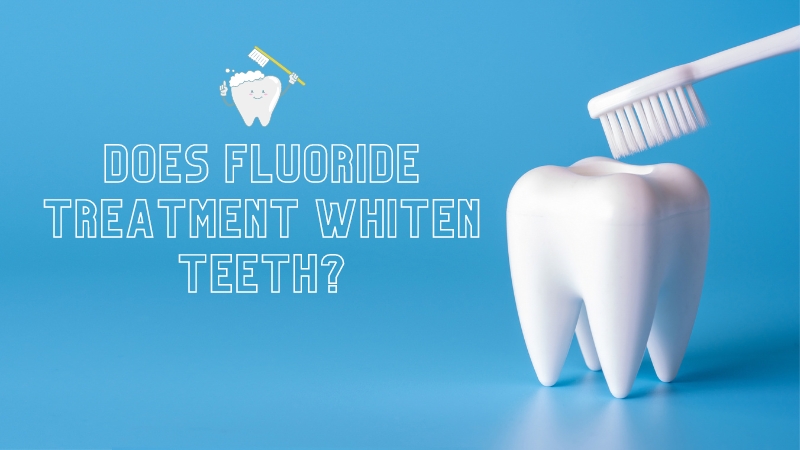
Does Fluoride Treatment Whiten Teeth? Uncovering the Truth
In recent years, the quest for achieving the perfect white smile has led many people to investigate various dental procedures and treatments. In this context, one question has been recurrent: “Does fluoride treatment whiten teeth?” This article seeks to provide a comprehensive and unbiased answer to this query, shedding light on the role and impact of Fluoride on our oral health.
Before delving into whether fluoride treatment can whiten teeth, it’s crucial to understand what Fluoride is and its various functions. Widely recognized as a significant component in dental health, Fluoride is a mineral that helps maintain the strength of our teeth and prevent tooth decay. However, many things need to be clarified about the capabilities and safety of Fluoride, especially in terms of its effects on the colour of our teeth.
In the following sections, we will explore Fluoride in greater detail. We will discuss its origin, usage in dentistry and crucial role in oral health. Furthermore, we will evaluate the safety of fluoride usage, particularly for children, and its effectiveness in alleviating tooth sensitivity. That will equip us with the necessary understanding to adequately address whether fluoride treatments have a whitening effect on teeth.
While this question might seem simple, the answer is multifaceted, relying on understanding various dental health elements. So, let’s embark on this journey together, demystifying the role of Fluoride and exploring its potential for enhancing our smiles.
1. What is Fluoride?
Fluoride is a natural mineral found in the earth’s crust and widely dispersed in nature. It’s present in varying concentrations in fresh and seawater, certain foods, and even the air we breathe. However, in the realm of dental health, it has gained significant importance due to its unique characteristics that enhance tooth strength and prevent decay.
Fluoride used in dentistry comes in two primary forms: topical and systemic. Topical Fluoride is directly applied to the teeth, including toothpaste, mouth rinses, and professionally applied fluoride treatments. These treatments, often gel, foam, or varnish, contain a much higher fluoride concentration than over-the-counter products.
On the other hand, systemic Fluoride is ingested into the body and becomes part of the tooth structure. It’s found in foods and beverages and can be added to a community’s water supply – a process known as fluoridation. It’s also available in dietary fluoride supplements, prescribed often in regions where fluoride levels in water are suboptimal.
But why is Fluoride used in dentistry? The answer lies in Fluoride’s unique interaction with tooth enamel. Tooth enamel, the hardest substance in the human body, primarily comprises hydroxyapatite, a crystal lattice structure of calcium and phosphate ions. When our teeth are exposed to the acids produced by the bacteria in our mouths, this structure is weakened, leading to what we know as tooth decay. When applied to the teeth, Fluoride is absorbed into the enamel and forms a new, more acid-resistant structure called fluorapatite.
In the next section, we will delve deeper into how this process works and its implications for our dental health, paving the way to answer our central question: “Does fluoride treatment whiten teeth?” Remember, understanding the fundamental concepts of Fluoride will allow us to address this query better.
What Is Fluoride? Uses, Benefits, Side Effects, and Safety
2. What Does Fluoride Do?
As mentioned earlier, Fluoride is pivotal in maintaining and enhancing dental health. This role can be boiled down to two primary actions: preventing tooth decay and strengthening tooth enamel.
Tooth decay, also known as cavities, occurs due to the demineralization of the tooth structure, which is triggered by the acids that bacteria in our mouths produce. These acids eat away at the hydroxyapatite crystals in the tooth enamel, weakening the tooth and making it more susceptible to decay. That is where fluoride steps in. It combats this demineralization process and even helps to reverse the early stages of decline through a process known as remineralization.
Fluoride is incorporated into the tooth structure during remineralization, creating a new crystal structure called fluorapatite. Fluorapatite is more resistant to acid attacks and helps to reinforce the tooth structure, making it less likely to succumb to cavities.
Moreover, Fluoride has a secondary, lesser-known effect known as bacterial inhibition. Fluoride can inhibit the metabolic processes of bacteria in dental plaque, reducing their ability to produce acid and thus further protecting the teeth from decay.
Fluoride is crucial in maintaining tooth health by strengthening the tooth structure and preventing decay. But does it whiten teeth? It’s a common question that we will address in the following sections.
Before we do so, it’s essential to discuss the safety of Fluoride, particularly when it comes to children, a demographic often more prone to tooth decay and the group for whom the benefits of Fluoride can be significant.
What Does Fluoride Do To Protect Your Smile?
3. The Debate: Does Fluoride Treatment Whiten Teeth?
Given Fluoride’s evident effectiveness in preventing tooth decay and strengthening tooth enamel, many wonders if Fluoride can also help whiten teeth. The truth is the relationship between fluoride and tooth colour is nuanced, and understanding it requires clarification on what we mean by “whitening.”
First and foremost, it’s important to distinguish between tooth whitening and tooth strengthening. Fluoride treatments are not designed to whiten teeth like professional teeth bleaching or whitening products. Professional whitening treatments use peroxides to break up stains on the tooth surface, whereas fluoride treatments strengthen the tooth enamel and prevent decay.
Fluoride can help maintain the natural colour of your teeth by protecting them from the effects of decay and acid erosion. By remineralizing enamel and creating a more robust, more resilient surface, Fluoride can help keep your teeth looking their best.
Moreover, it’s worth noting that certain types of discolouration, such as those caused by tetracycline stains or fluorosis (a condition caused by overexposure to Fluoride during tooth development), can’t be remedied by a fluoride treatment. Excessive Fluoride during childhood can lead to dental fluorosis, which can discolour teeth.
In conclusion, Fluoride is essential in maintaining your teeth’ health and natural colour, but it has no direct whitening effect. Its strength lies in prevention and protection, vital to maintaining a healthy and radiant smile. However, always consult with a dental professional for individual advice on preserving the whiteness of your teeth.
In the following sections, we will further explore the safety of Fluoride, particularly for children, and its benefits for those with sensitive teeth.
Does Using Fluoride Whiten Teeth?
4. Is Fluoride Safe for Children?
The question of Fluoride’s safety, particularly for children, is valid. After all, as parents and caregivers, we want what’s best for our little ones. The American Dental Association (ADA) and the American Academy of Pediatric Dentistry both advocate using Fluoride in appropriate amounts as an effective measure to prevent tooth decay in children. But what does “appropriate” mean, and are there any risks to be aware of?
Infants and children under the age of 3 should use an amount of fluoride toothpaste equivalent to a grain of rice, while those between ages 3 and 6 should use a pea-sized amount, as the ADA recommends. This controlled use helps to prevent the risk of dental fluorosis. This condition can cause discolouration or white spots on the teeth due to excessive fluoride ingestion during tooth development. (Source)
While fluoride toothpaste and professionally applied fluoride treatments can be beneficial, fluoride supplements should only be used for children living in non-fluoridated areas and at high risk for tooth decay. These should only be taken under the supervision of a dental or medical professional.
Additionally, for communities with fluoridated water, the benefits of Fluoride can be obtained just by drinking tap water, thus decreasing the need for additional supplementation. The Centers for Disease Control and Prevention (CDC) has reported that community water fluoridation can reduce tooth decay by about 27% in children and adults. (Source)
In conclusion, Fluoride is safe and beneficial for children when used correctly. However, as with any health intervention, it’s important to follow professional guidelines to ensure it’s used safely and effectively.
Next, we’ll discuss Fluoride’s potential benefits for those with sensitive teeth, another critical piece of the fluoride puzzle.
Read more about Fluoride guidance for children HERE.
5. Is Fluoride Good for Sensitive Teeth?
Tooth sensitivity can be a frustrating and sometimes painful problem. It occurs when the tooth’s dentin – the layer underneath the enamel – is exposed. That can happen due to receding gums, enamel erosion, or tooth decay, among other causes. The exposed dentin contains microscopic channels that lead to the tooth’s nerve, and when these channels are stimulated by hot, cold, sweet, or acidic foods, tooth sensitivity can occur.
Fluoride can be a valuable tool in managing tooth sensitivity. By strengthening tooth enamel and promoting remineralization, Fluoride can help seal these microscopic channels in the dentin, reducing pain or discomfort. Various fluoride-containing products, such as toothpaste and mouth rinses, are specifically designed to help alleviate sensitivity.
However, it’s important to note that while Fluoride can effectively manage tooth sensitivity, it’s not a cure. Depending on the sensitivity, it’s often used as part of a broader treatment plan that may include other interventions such as dietary changes, desensitizing toothpaste, or dental procedures.
Remember, tooth sensitivity can be a sign of underlying dental issues, so if you’re experiencing sensitivity, you must consult a dental professional. They can determine the cause and recommend the best course of treatment, including Fluoride.
In conclusion, while Fluoride doesn’t whiten teeth traditionally, it plays a vital role in maintaining oral health, preventing tooth decay, and managing tooth sensitivity. Its strength lies in its protective properties, which keep our teeth strong and resilient.
Conclusion
In this article, we delved into the world of Fluoride, seeking to clarify its role in our dental health and address the central question: “Does fluoride treatment whiten teeth?”
Regarding Fluoride’s safety, particularly for children, we learned that Fluoride is safe and beneficial when used appropriately. It can help prevent tooth decay, one of the most common childhood diseases. However, Fluoride must be monitored to avoid dental fluorosis, a condition caused by excessive fluoride intake.
Finally, we explored the benefits of Fluoride for individuals with sensitive teeth. By strengthening enamel and promoting remineralization, Fluoride can help alleviate tooth sensitivity, although it’s usually part of a broader treatment plan.
The bottom line is that Fluoride is a crucial ally in maintaining good dental health. Its strength lies not in altering the colour of our teeth but in protecting and strengthening them, helping us to keep our smiles healthy and resilient.
Remember, it’s always best to consult a dental professional for advice tailored to your oral health needs. This article aims to inform and guide but not replace professional dental advice. Keep smiling!
Here are some useful links about Fluoride:
- American Dental Association: Fluoride: Topical and Systemic Supplements: https://www.ada.org/en/member-center/oral-health-topics/fluoride-topical-and-systemic-supplements
- Centers for Disease Control and Prevention: Community Water Fluoridation: https://www.cdc.gov/fluoridation/index.html
- National Institute of Dental and Craniofacial Research: Fluoride: https://www.nidcr.nih.gov/health-info/fluoride/the-story-of-fluoridation
- American Academy of Pediatric Dentistry: Guideline on Fluoride Therapy: https://www.aapd.org/research/oral-health-policies–recommendations/fluoride-therapy/
Recommended products to use for a perfect smile and oral health:
